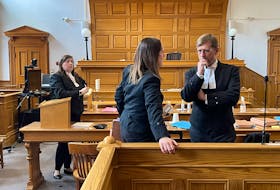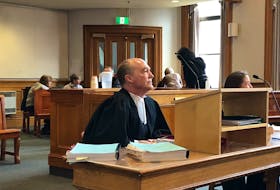ST. JOHN'S, N.L. — The province’s Supreme Court has dismissed appeals by a local lawyer and the law society, saying an adjudication tribunal had been right to dismiss one breach-of-conduct complaint against the lawyer but uphold a second one.
Both complaints against St. John’s lawyer Brian Wentzell were connected to his representation of the owners of a Grand Falls-Windsor bowling alley a decade ago. The two business partners brought a negligence lawsuit against the town after the bowling alley was damaged in a series of floods. The bowling alley insurers also launched a lawsuit against the town, claiming the covered losses.
The town’s insurers offered to settle both actions for a combined $80,000, minus legal fees and expenses. Wentzell made an offer on behalf of his clients to accept a final settlement of $40,000 of the uninsured claim, but when he forwarded them the paperwork, they refused to sign it, saying they had never given him instruction to settle for that amount. The town’s insurers went to court to have the settlement enforced and the bowling alley owners hired other lawyers to represent them. Wentzell filed an affidavit in support of the town’s insurers, saying he had been instructed to make the offer.
The court enforced the agreed settlement and the bowling alley owners sued Wentzell, who conceded he had been instructed to take the deal, but had not done it through the proper procedure. The two bowling alley owners were each awarded $25,000 in damages and Wentzell was ordered to pay another $100,000 for lost profits. He also had to refund his legal fees.
After investigating Wentzell’s conduct related to the bowling alley owners, the Law Society of Newfoundland and Labrador brought the matter to an adjudication tribunal. The tribunal dismissed a complaint that Wentzell had breached his professional code of conduct by settling the claim without any instruction to do so, saying it had not been able to conclude that was the case, based on the evidence presented. The tribunal found Wentzell had breached his duty when he filed the affidavit against his former clients without speaking with them.
At the end of 2018, the law society filed an appeal of the tribunal’s ruling on the first claim; Wentzell appealed the ruling on the second one.
Justice Daniel Boone dismissed both appeals in a decision published Monday.
The law society argued the tribunal had made a mistake in dismissing the first complaint given Wentzell’s testimony wasn’t consistent with much of the evidence and he had admitted liability when his ex-clients sued him.
“It may be that different inferences or conclusions could have been drawn from certain parts of the testimony or from any of the documents. However, it was the task of the tribunal to weigh and consider all the evidence and make factual findings. In the absence of palpable and overriding error, this court must defer to their findings,” Boone wrote.
Wentzell argued the tribunal had made a mistake when it determined he had breached his duty by filing the affidavit, saying he could have been subpoenaed to testify to the same information and his duty to the court is higher than his duty to his clients.
“A solicitor has an obligation to hold in confidence all communications with his clients or former clients,” Boone wrote.
“The solicitor also has an obligation to advise the clients or former clients that the information has been requested. The clients can then take a position on whether the solicitor can disclose the communication and even argue before the court on the question whether the solicitor has to disclose. It is not for the solicitor to make this determination without consultation with the clients.”
Wentzell is best known for representing Ray Newman, who was acquitted of the 2007 murder of his wife, Chrissy Predham-Newman. In 2017 the law society reprimanded him, banned him from alcohol for two years, ordered him to submit to monthly alcohol tests for a year and ordered him to pay $5,000 after he was found to have been drunk and drinking alcohol in the courtroom in one instance and, in another instance, had refused the breathalyzer after a traffic accident in which the pickup he was driving struck a pole and almost hit a pedestrian. For the latter incident Wentzell was also criminally charged, and was given a 14-month driving suspension and a $2,300 fine.









